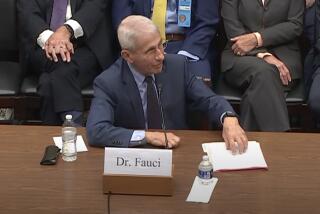First Phase of Hearings Ends : After 18 Witnesses, Many Major Questions Remain
- Share via
WASHINGTON — After delineating what a leading committee member called “a depressing story” of official misconduct, private greed and public deception, Congress Tuesday concluded the first six-week phase of the Iran- contra hearings.
After more than 100 hours of testimony by 18 witnesses, members of the Senate and House investigating committees acknowledged that they have not yet answered many key questions, including whether President Reagan approved the diversion of funds from the Iranian arms sales to the Nicaraguan resistance.
“The jury is still out” on Reagan’s role, Rep. Lee H. Hamilton (D-Ind.) said, even though “those involved, whether public officials or private citizens, had no doubt they were acting on the authority of the President of the United States.”
Panelists hope the President’s participation will be examined more closely when the committees hear from former White House aides John M. Poindexter and Oliver L. North. The former Reagan aides will be the most important witnesses called during the second phase of the hearings, which begin June 22.
Yet the first phase of the Iran-contra hearings have convinced members that Reagan personally encouraged private and third-country donations to the contras at a time when direct and indirect U.S. military aid was banned by Congress. Nor is there any doubt in their minds that some top Reagan aides were permitted to create an elaborate private apparatus to conduct a secret foreign policy in Central America and the Middle East.
“Surely, it seems to me, these committees have heard some of the most extraordinary testimony ever given to the United States Congress,” Hamilton said in a closing statement.
“What these committees have heard is a depressing story. It is a story of not telling the truth to Congress and to the American people. It is a story about remarkable confusion in the processes of government.”
Sen. Sam Nunn (D-Ga.) said Reagan’s current problem in the Persian Gulf is a direct result of the Iran-contra scandal and it demonstrates “how bad a mess you can get into when you carry out this kind of incoherent policy.”
“I don’t think you can divorce what happened in the past with what is happening in the Persian Gulf now,” he said.
Sensitive Initiatives
What seemed to irk committee members most was evidence that private citizens without security clearances were privy to sensitive foreign policy initiatives that had been withheld from members of Congress. Albert A. Hakim, financial manager of the private Iran-contra network, admitted to the committees that he still had possession of a top-secret encryption device belonging to the U.S. government.
Nor did Congress appreciate learning that it had been misled about the extent of Administration assistance to the contras. No other witness heard more criticism from the committee than Assistant Secretary of State Elliott Abrams, who acknowledged that he had testified falsely to a congressional committee about soliciting a $10-million donation from the Sultan of Brunei.
“Government cannot function cloaked in secrecy,” Hamilton said. “It cannot function unless officials tell the truth. The Constitution only works when the two branches of government trust one another and cooperate.”
Although the Iran-contra network was established to provide military assistance for the contras, the evidence shows that it also generated considerable profits for those private citizens who got involved. According to testimony, the private fund-raisers themselves took 35% off the top, and there is still about $8 million in a web of Swiss bank accounts under the control of Hakim and his partner, retired Air Force Maj. Gen. Richard V. Secord.
Secord clearly failed to convince the committee that he was motivated by patriotism--and not by profit--when he acted as middleman in the Iran-contra operation. He is expected to be recalled to square his earlier testimony with new evidence that he withdrew money from the Iran-contra account to buy a sports car, an airplane and a trip to a luxury health spa.
“Clearly,” Nunn said, “the American flag that was being used to hide greed has been pierced.”
Diplomatic Meetings
Like other members of the committees, Sen. David L. Boren (D-Okla.) indicated that he was disturbed that Hakim and Secord were permitted to conduct diplomatic meetings with Iranian officials on behalf of the U.S. government. He noted that Secord misrepresented U.S. policy toward Iraq and Iran during these meetings.
“You had people of questionable motivation and people of questionable competence and expertise speaking for the United States,” Boren said.
Hamilton added: “Privatization of foreign policy is a prescription for confusion and failure. The advancement of American national interest depends on the full use of the many resources of the United States. The use of private parties to carry out the high purpose of the government make us the subject of puzzlement and ridicule.”
Although most of the testimony so far has portrayed North as the central figure in the Iran-contra affair, Hamilton indicated that committee members do not believe that he acted without the authority and knowledge of other Administration officials.
Hamilton asked: “Who supervised Col. North? Who was responsible for U.S. funds earned from the sale of U.S. arms? Who asked whether actions taken were lawful?” Questions such as these appear certain to be raised in the final phase of the hearings.
Excerpts from Tuesday’s testimony, Page 16.
More to Read
Get the L.A. Times Politics newsletter
Deeply reported insights into legislation, politics and policy from Sacramento, Washington and beyond. In your inbox twice per week.
You may occasionally receive promotional content from the Los Angeles Times.










